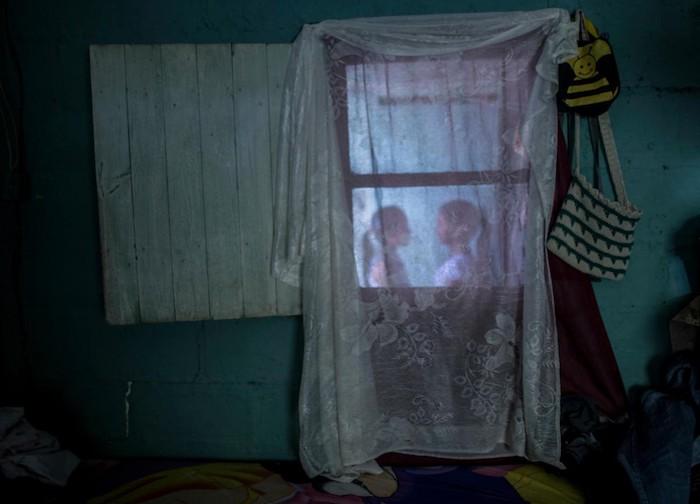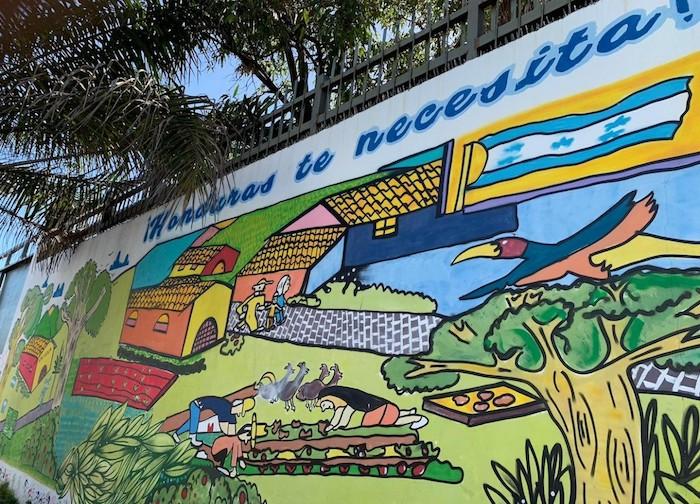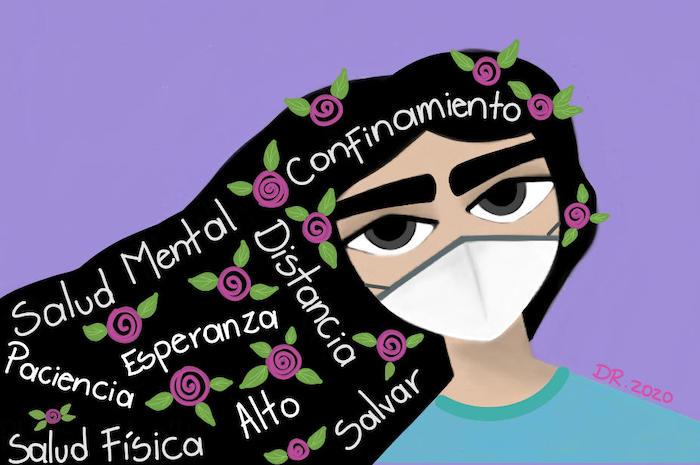Inside Look: COVID-19 and the Migrant Crisis
Lea Beaudry, UNICEF Child Protection Specialist in Honduras, recently spoke with Eitan Peled, Child Migration & Protection Program Manager for UNICEF USA, about how COVID-19 has created new dangers and complications for already vulnerable children and families in the country and how UNICEF has had to innovate and change course on the ground to deliver support and services.
This conversation has been edited and condensed.
Please tell us a little bit about your role with UNICEF Honduras.
"I manage a team of four fabulous child protection officers. We work on violence prevention and interruption strategies within the home, within communities and within schools, on juvenile justice and a number of other programs. And we focus on strengthening child protection systems — ensuring that state authorities are providing good protection services and reaching every Honduran child, even the most vulnerable.
A key part of our child protection programming is working to protect migrant children and families throughout their journey. We work with Honduran consular offices throughout the region to make sure migrants have access to services, that they know their rights and if they are victims of a crime they can report it. We work closely with our colleagues at UNICEF Mexico, other NGOs, etc. — there is a whole network of partners working in the region, working together to protect migrants along the migratory routes, making sure they have the services they need.
And we protect children upon their return — because so many are ultimately deported — making sure returning migrants have access to emergency mental health services, to help them deal with the scary circumstances they likely faced on their journey. And we support their reintegration back into society — such as helping them re-enroll in school."
Can you explain what prompts so many children and families to flee their homes, even now, in a pandemic?
"There are exceedingly high rates of violence and abuse against children in Honduras. We conducted a national survey with our partners in 2017, and we found that 44 percent of girls and 37 percent of boys were victims of physical, emotional and/or sexual abuse. Often it is related to gang violence. Adolescents are especially at risk of violent death — 4,844 adolescent girls and boys were murdered here between 2010 and 2018. That is two kids murdered every day in our country. And because of the pandemic, many are now quarantined with their abusers."

"It's the widespread violence that compels these kids and families to flee north. Women with abusive husbands or boyfriends take their children and run. The hope is that there will be a better chance of making it, of surviving, of having access to better education, etc. The Hondurans who flee really see Mexico and the U.S. as lands of opportunity.
So, while we understand their decision to leave, the goal of our violence prevention programming is to create a scenario in which the families don’t have to flee in the first place."
And many of those who flee end up back in Honduras...
"Yes. Between 2014 and 2018, there were over 300,000 deportations back to Honduras, including about 44,000 children. They were deported after attempting to migrate north to the U.S. or Mexico. Our work supporting returning migrants is intensifying now. The pandemic is making everything more complicated, and more urgent. People are still trying to migrate north, despite the pandemic. That is how desperate the situation is for so many families.
And it's gotten harder to leave, so they are taking irregular routes, slipping through the country's blind spots. They are relying more on human smugglers, or coyotes, many of whom are connected to criminal networks, and the risk of being trafficked is very real. And like before, many children are leaving Honduras unaccompanied, making their way north only to be turned away."
Can you walk us through the process — what happens to children when they are deported — and speak to the role that UNICEF plays?
"Since the start of the pandemic, the U.S. has basically stopped processing asylum cases and is engaging in rapid deportations, sending kids back almost immediately.
This is where the pandemic has really had an impact. Before, unaccompanied children would be processed by various U.S. agencies as they go through the asylum process. Now they are being remitted immediately back to Honduras. This makes it very difficult to coordinate protections. There is also very little advance notice that these kids are coming in."

"When a child is deported, the consulate offices are supposed to alert the National Child Protection Agency in Honduras that a child is en route, so that someone from the agency can meet the child at the airport. But we've had situations where a child arrives at the airport and the agency wasn't aware they were coming. So we have to scramble to get some support lined up for that child. We work with a network of civil society organizations in Honduras who help us with these ad hoc cases.
Their first stop upon returning is the Belén Center for Migrant Children and Families in San Pedro Sula, on the north coast. At Belén, the child is given a rapid test for COVID-19 — this is standard procedure for all returning migrants — and then placed under a mandatory 14-day quarantine, also standard, at one of the facilities the government has set up for this purpose. UNICEF is working with the government to ensure these spaces are child-friendly."
How so?
"Well, these kids in many cases have been on the move for weeks or months even, and now they are in quarantine. They can't talk to their families, and they don't have any possessions, nothing to do or play with. We work to ease their anxiety and their stress — we give them toys, a chance to play sports, engage in recreational activities. We also make sure they get the health care they need. We make sure the child gets a psychological evaluation and a medical evaluation and is seen by a counselor.
And we work to get a better sense of why that girl or boy migrated to the U.S. in the first place. We determine whether there is a living family member in Honduras who could legally take charge of that girl or boy. We figure out what conditions in his home community may have prompted the decision to leave — maybe a gang was trying to recruit him, in which case it is obviously not safe for them to go home. We see if maybe the child can be relocated to a family member in another part of the country. We look into possibilities for regional relocation."
Even with testing and the mandatory quarantine, there is this fear that returning migrants are bringing COVID-19 back with them, correct?
"Unfortunately yes. They are being viewed with greater suspicion by their own communities. There is a stigma, an assumption that if you have been up north, then you must be infected with the virus. We are working to dispel those misconceptions — about how the virus is spread, and also how to contain it — through our public awareness campaigns. The UNICEF U-Report mobile platform and chatbot have helped reach a lot of people in Honduras with critical information."

The risk of being infected by the virus while on the move is real, of course, though...
"True. The migrant shelters in Mexico are very crowded, and physical distancing is impossible. So that puts them at increased risk of contracting coronavirus — not only the migrants, the children and families, but also the child protective personnel who work in these protection sectors. It's a very difficult situation. And when they come back, they are coming back to a country with a collapsed health care system. All hospitals in Honduras are beyond capacity treating COVID patients. They're turning away many, many Hondurans who come looking for health care assistance.
So it's frustrating for us, for UNICEF and a lot of our partners on the ground, to see that children keep being returned back to Honduras — a state that, overwhelmed by the COVID-19 crisis, is unable to provide basic protection and health care services.
It's also important to note that the country's quarantine measures represent a very high risk for children and women who are stuck in abusive relationships. It's been increasingly difficult for those who are stuck in these precarious positions, basically living under quarantine with their abusers, to have access to services. So we've been working with municipal governments to install child helplines. Kids can call in to the municipal office for child and adolescent services or send a WhatsApp message or a Facebook message and say, "Hey, I need help."
These services have helped a lot of girls and boys who are living under a lot of stress. Schools have been closed since mid March. Kids are unable to leave their houses. They're not seeing their friends. There's a lot of tension within the family. So these child helplines have really become lifelines in accessing mental health services. We have a network of some 50 mental health workers, co-funded by municipal governments, that UNICEF has helped train, and they're providing 24/7 support through these help lines."
Sounds like an amazing intervention. So what does mental health support from UNICEF look like without the in-person visits or group activities that would normally be taking place?
"Psychosocial support, a mental health intervention, involves a lot of game playing — games designed to reveal certain emotional indicators, such as aggressiveness, anxiety and sadness, and other effects of trauma. Psychosocial support works through these games. With the pandemic, we've turned to teaching parents how to carry out these activities with their kids at home. So, using the same child helplines that I mentioned earlier, we're working on coaching moms and dads on these really easy-to-replicate games and how they can walk their kids through processing their emotions.
We've also adapted the methodology to be able to reach the kids who are in the temporary quarantine shelters for two weeks. We work with the health care professionals who have access to those centers and we teach them these same psychosocial support skills and games so they implement them with the kids, give them a bit of mental health support and make them feel better, less anxious and less stressed by their situation."
You are dealing with some very harrowing circumstances, clearly. What gives you hope?
"I would say the essential workers and their heroic efforts to provide the basic healthcare, food, protection to the most vulnerable. In Honduras, we're seeing fantastic health professionals doing their best, social workers, essential staff, but also community workers. We work with a lot of community leaders and organizations and they are really banding together to provide food, mental health support and protective shelter to the most vulnerable families, migrants and displaced populations. They are showing tremendous resilience. That gives me hope that together we can beat this crisis, and we can come back stronger and hopefully more united."
For those who are reading this and want to help, what can they do?
"Talk to your friends and families about the dangers that migrants face in transit and once they return back home. I think the more people are aware, the more collective effort there will be to ensure that these children are not returned if their lives are at risk, and to improve services for migrants at every step."
So ask elected officials to stop deporting kids to unsafe places.
"Yes."
And give to UNICEF! Because these programs need funding.
"Absolutely!"
